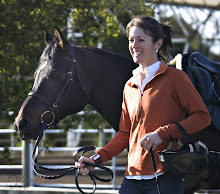There is no industry standard per se on lesson and training fees, although most equine professionals charge similar amounts with the exception of a few high rollers setting outrageous fees. But unlike environments like corporate America, there is no clear correlation between a trainer's experience, qualifications, and salary. It's all sort of random.
However, possession of one particular asset does seem to ensure a trainer's ability to charge-- and receive-- rather lofty figures. A foreign accent allows an instructor who might otherwise make $60 per lesson to charge over $100. It matters not whether the accent is Slovakian, Finnish, or German.
All that counts is that it hints of a person's roots being beyond U.S. soil. This fact alone gives the person a huge advantage in attracting equestrian clientele. His skills never need to be scrutinized; the foreign accent, along with a tidy riding outfit, leads to the assumption that he is in fact superior to domestic trainers. It's much like assuming that because someone is Japanese, he must be an expert of sushi. Riding and horsemanship have existed for so much longer overseas that we Americans tend to cling to foreigners as if their DNA is encoded with riding wisdom.
I myself was lured in by the centuries of dressage traditions in Europe and over the years have made not one, but twelve, pilgrimages to ride and train there. Honestly, I can't tell you that I learned any more there than I have from my domestic trainers here in the U.S., but I did come away with a feeling of storybook magic-- cobbled barn courtyards, well-groomed horses, charming little indoor arenas, and well, all those accented lessons.
Following an instructor's directives in a lesson is difficult enough. I can tell you that when you only marginally understand what he's saying, it's far worse.
One time in Portugal, my mother and I were being yelled at to "Sit cloze to zee wizards!" My mom tried to satisfy the instruction by riding her horse close to everything around-- the fence railing, spectators, chairs. Our trainer kept yelling. Finally, Mom trotted her horse up alongside mine and through clenched teeth asked me, "Where the hell is the wizard?"
I chuckled. "Withers, Mom. Sit close to the horse's withers...."
I figured I was owed a good chuckle because a month earlier, I suffered my own accent-induced embarrassment. In Germany, I convinced the revered trainer Egon von Neindorff, by then a very old and cynical man, to allow me the use of a translator for my lessons as I didn't speak German very well and old Neindorff refused to speak anything but his native tongue. An American journalist kindly sat in on my lesson, translating every comment Neindorff made to me, which wasn't much. His lesson went much like this:
"Trot.......good.......Walk......good....Circle....good."
Then, the translator got up to use the bathroom and the second she left the arena, Neindorff started spewing orders in rapid fire. Of course, I had no clue what the old codger was saying, so I just kept trotting my horse. This was obviously the wrong decision. Neindorff's voice escalated, he fired off instruction even faster, his arms waved. Panicked, I clenched by legs and held my breath, which must have been the cue for my mare to begin a lovely, if entirely unsolicited, piaffe.
There I sat atop this horse with legs moving wildly, and yet we were going nowhere. I poked with my spur, I clucked... and we went faster in place. She bounced up and down, working herself into a lather and I could not get her to move forward. I was horrified. But then I noticed Neindorff had stopped shouting at me. I looked across to arena to find that he was doubled over, holding his stomach in laughter, so heartily humored by my embarrassment that he was gasping for air.
More recently, my mentor-- a Spaniard living in Australia-- unleashed his own very strange dialect in an order that went something like: "Now, mike aye twanty meh-ter half curcle." Confused, I just kept trotting (obviously having learned nothing from my previously mentioned German adventures) while he stared at me. He repeated his instruction, giving me the benefit of being hearing deficient. Then he stared more. After I trotted another four times around the arena, he asked wearily "Why you no do what I tell you?"
If only I knew what he told me...
Friday, August 8, 2008
Subscribe to:
Post Comments (Atom)





2 comments:
Ohhh, THOSE Wizards!
Very entertaining blog. The humor is in the naked truth. Having a somewhat deaf left ear I try to keep my instructors on the right, much to their frustration.
Post a Comment